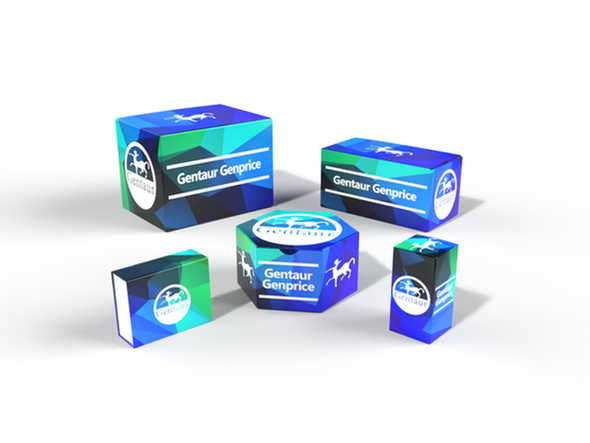749
Human Anti-titin Antibody (TTN) ELISA Kit | KTE62619
- SKU:
- 749-KTE62619
- Availability:
- Usually ships in 5 working days
Description
Human Anti-titin Antibody (TTN) ELISA Kit | KTE62619 | Gentaur UK, US & Europe Distribution
Application: This Human Anti-titin Antibody (TTN) ELISA Kit employs a two-site sandwich ELISA to quantitate TTN in samples. An antibody specific for TTN has been pre-coated onto a microplate. Standards and samples are pipetted into the wells and anyTTN present is bound by the immobilized antibody. After removing any unbound substances, a biotin-conjugated antibody specific for TTN is added to the wells. After washing, Streptavidin conjugated Horseradish Peroxidase (HRP) is added to the wells. Following a wash to remove any unbound avidin-enzyme reagent, a substrate solution is added to the wells and color develops in proportion to the amount of TTN bound in the initial step. The color development is stopped and the intensity of the color is measured.
Detection Method: Colorimetric
Conjugate: N/A
Sample Type: Cell culture supernatants#Serum#Plasma#Other biological fluids
Assay Type: Multiple steps standard sandwich ELISA assay with a working time of 3-5 hours. It depends on the experience of the operation person.
Kit Component: • Human Anti-titin Antibody microplate
• Human Anti-titin Antibody standard
• Human Anti-titin Antibody detect antibody
• Streptavidin-HRP
• Standard diluent
• Assay buffer
• HRP substrate
• Stop solution
• Wash buffer
• Plate covers
Features & Benefits: Human Anti-titin Antibody (TTN) ELISA Kit has high sensitivity and excellent specificity for detection of Human TTN. No significant cross-reactivity or interference between Human TTN and analogues was observed.
Calibration Range: Please inquire
Limit Of Detection: Please inquire
Usage Note: • Do not mix components from different kit lots or use reagents beyond the kit expiration date.
• Allow all reagents to warm to room temperature for at least 30 minutes before opening.
• Pre-rinse the pipet tip with reagent, use fresh pipet tips for each sample, standard and reagent to avoid contamination.
• Unused wells must be kept desiccated at 4 °C in the sealed bag provided.
• Mix Thoroughly is very important for the result. It is recommended using low frequency oscillator or slight hand shaking every 10 minutes.
• It is recommended that all samples and standards be assayed in duplicate or triplicate.
Storage Instruction: The unopened kit should be stored at 2 - 8°C. After opening, please store refer to protocols.
Shipping: Gel pack with blue ice.
Precaution The product listed herein is for research use only and is not intended for use in human or clinical diagnosis. Suggested applications of our products are not recommendations to use our products in violation of any patent or as a license. We cannot be responsible for patent infringements or other violations that may occur with the use of this product.
Background: Titin is a large abundant protein of striated muscle. A N-terminal Z-disc region and a C-terminal M-line region bind to the Z-line and M-line of the sarcomere respectively so that a single titin molecule spans half the length of a sarcomere. Titin also contains binding sites for muscle associated proteins so it serves as an adhesion template for the assembly of contractile machinery in muscle cells. It has also been identified as a structural protein for chromosomes. Considerable variability exists in the I-band, the M-line and the Z-disc regions of titin. Variability in the I-band region contributes to the differences in elasticity of different titin isoforms and, therefore, to the differences in elasticity of different muscle types. Of the many titin variants identified, five for which complete transcript information is available are described.
Alternative Names: TTN
Search name: TTN
Tag: TTN










